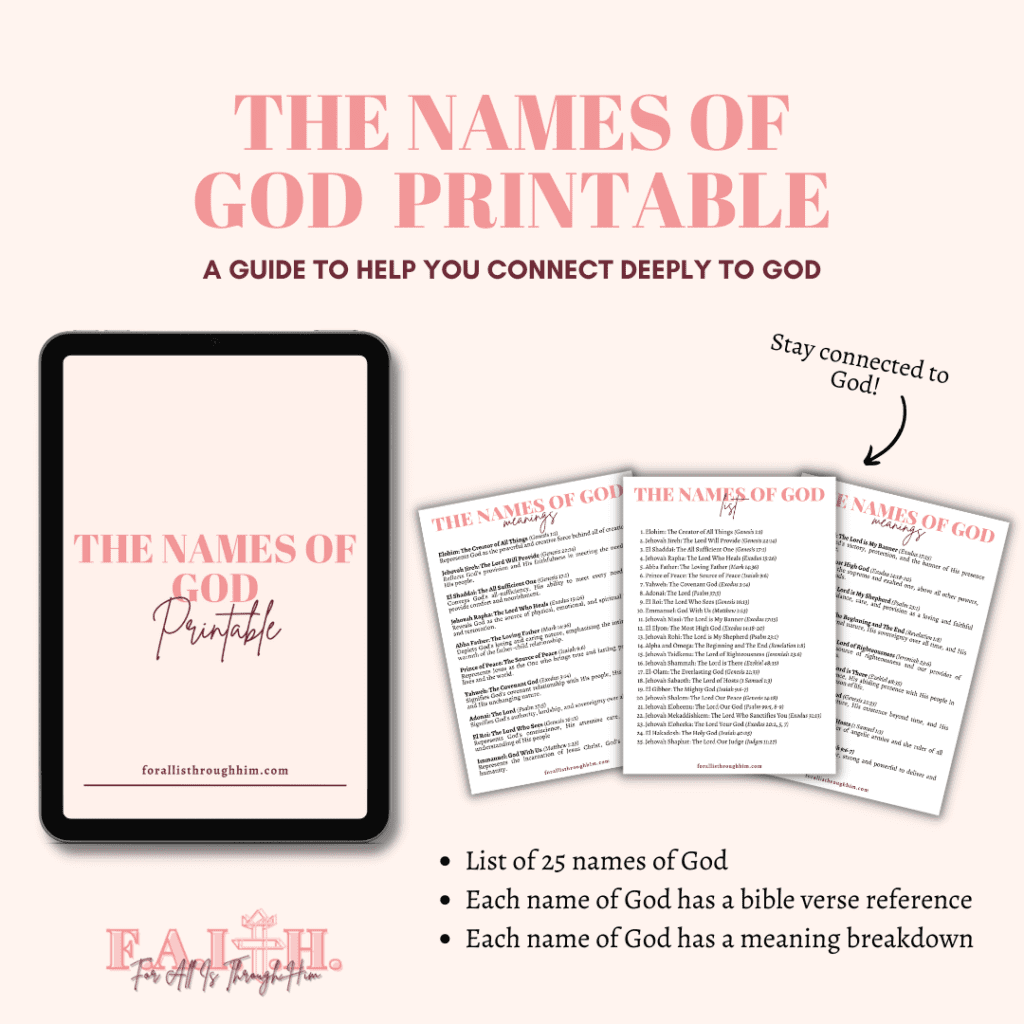In the vast tapestry of creation, the names of God shine as radiant jewels, revealing glimpses of His character, attributes, and boundless love for His creation. Each name reflects a facet of His infinite nature and invites us to draw closer to Him, to know Him intimately, and to experience the transformative power of His presence. Join me as we explore a few of the powerful names of God, each one a doorway to a deeper understanding of His divine majesty.
Let’s dive in!
The Names of God Free Printable
This printable is filled with 25 names of God that you can print off and hang around your room, use in your quiet time with Jesus to meditate on, use the verses in your prayer time and so much more. This is a great way to understand the character of God and connect deeper with Him.
You can download The Names of God printable here:

1. Elohim: The Creator of All Things
“In the beginning God created the heavens and the earth.” (Genesis 1:1).
The name “Elohim” holds significant meaning as it refers to God as the Creator of all things. It is one of the most commonly used names for God in the Bible and is mentioned over 2,500 times. The term “Elohim” is derived from the Hebrew word “El,” which means God, and it carries the connotation of strength, power, and authority. In the beginning, Elohim spoke and brought forth the heavens and the earth. This name encapsulates God’s creative power and His authority over all things. As we meditate on this name, let us be reminded of His sovereignty, and trust in His divine plan for our lives, may it deepen our awe, gratitude, and worship for the One who formed us and sustains us.
2. Jehovah Jireh: The Lord Will Provide
“So Abraham called that place The Lord Will Provide. And to this day it is said, “On the mountain of the Lord it will be provided.”” (Genesis 22:14).
The name “Jehovah Jireh” carries profound meaning as it refers to God as the Lord who provides. It combines the Hebrew name “Jehovah,” which signifies the self-existent and eternal nature of God, with “Jireh,” which means “to see” or “to provide.” This name is mentioned in Genesis 22:14 when Abraham, in obedience to God, was about to sacrifice his son Isaac, and God provided a ram as a substitute. In times of need and uncertainty, we find solace in the name Jehovah-Jireh. Just as God provided a ram as a substitute for Isaac on Mount Moriah, He continues to be our faithful provider. He meets our needs, whether physical, emotional, or spiritual. Let us approach Him with faith, knowing that He is the source of all blessings and knowing that He sees our needs and will provide according to His perfect plan.
Related: Jehovah Jireh Wall Art Printable
3. El Shaddai: The All-Sufficient One
“When Abram was ninety-nine years old, the Lord appeared to him and said, “I am God Almighty; walk before me faithfully and be blameless.” (Genesis 17:1).
The name “El Shaddai” carries deep meaning as it refers to God as the All-Sufficient One, the Almighty, and the One who is more than enough. It combines the Hebrew word “El,” which means God, and “Shaddai,” which has various interpretations, including “the Almighty” or “the One who is self-sufficient.” The name El Shaddai is mentioned several times in the Bible, emphasising God’s abundant provision, power, and sustenance. El Shaddai reminds us that God is more than enough for every situation we face. He is the Almighty, the One who is all-powerful and abundantly able to meet our every need. In our weakness, He shows Himself strong. Let us find comfort and strength in this name, knowing that we can fully rely on Him.
4. Jehovah Rapha: The Lord Who Heals
“So Abraham called that place The Lord Will Provide. And to this day it is said, “On the mountain of the Lord it will be provided.”” (Exodus 15:26).
The name “Jehovah Rapha” carries profound meaning as it refers to God as the Lord who heals. It combines the Hebrew name “Jehovah,” which signifies the self-existent and eternal nature of God, with “Rapha,” which means “to heal” or “to restore.” This name is mentioned in Exodus 15:26 when God revealed Himself to the Israelites as their healer. The name Jehovah Rapha carries the promise of divine healing and restoration. Just as God revealed Himself as the healer of the Israelites in the wilderness, He continues to bring healing to our brokenness, be it physical, emotional, or spiritual. Let us approach Him with confidence, trusting in His perfect plan for our well-being. As we trust in Jehovah Rapha, may we seek His healing touch, both for ourselves and for others, and find comfort in knowing that He is the source of true and lasting healing.
Related: Jehovah Rapha Wall Art Printable
5. Abba Father: The Loving Father
““Abba, Father,” he said, “everything is possible for you. Take this cup from me. Yet not what I will, but what you will.”” (Mark 14:36).
The name “Abba Father” carries profound meaning as it refers to God as our loving and intimate Father. It combines the Aramaic word “Abba,” which means “Father” or “Daddy,” with the term “Father” in English. This name is mentioned in the New Testament, particularly in the teachings of Jesus and the writings of the apostle Paul. Abba Father expresses the intimate relationship we have with God as His beloved children. It reminds us of His unconditional love, compassion, and care for us. Through Jesus Christ, we have been adopted into His family, and we can approach Him with childlike trust, knowing that our Heavenly Father cherishes us. As we embrace God as our Abba Father, may we experience the depths of His love, find comfort in His presence, and walk confidently in the assurance that we are cherished and treasured by our Heavenly Father.
6. Prince of Peace: The Source of Peace
“For to us a child is born, to us a son is given, and the government will be on his shoulders. And he will be called Wonderful Counselor, Mighty God, Everlasting Father, Prince of Peace.” (Isaiah 9:6).
The name “Prince of Peace” carries great meaning as it refers to God as the source and giver of peace. It is a title given to Jesus Christ, the Son of God, and is mentioned in Isaiah 9:6 in the Old Testament. In a world filled with turmoil and unrest, we find our peace in the name of Jesus, the Prince of Peace. He offers a peace that transcends understanding, a peace that guards our hearts and minds. Let us surrender our worries and anxieties to Him, trusting in His ability to bring calmness and serenity to our lives. Also, as we embrace Jesus as our Prince of Peace, may His peace fill our hearts, transform our lives, and empower us to be peacemakers in a world longing for the true peace that only He can provide.
Related: Jehovah Shalom Wall Art Printable
7. Yahweh: The Covenant God
“God said to Moses, “I am who I am. This is what you are to say to the Israelites: ‘I am has sent me to you.’”” (Exodus 3:14).
The name “Yahweh” is one of the most significant names of God in the Bible. It is the personal name of God revealed to Moses in Exodus 3:14 when Moses asked God for His name. The meaning of “Yahweh” is often understood as “I AM” or “the self-existent one.” Yahweh, the sacred name of God revealed to Moses, portrays His faithfulness and commitment to His people. It signifies the covenant relationship between God and His chosen ones. Yahweh reassures us of His unchanging love, His steadfast presence, and His promises that endure throughout generations. Knowing that we serve a covenant-keeping God empowers us to trust Him completely and walk in His ways. As we embrace Yahweh, may we enter into a covenant relationship with Him, trust in His faithfulness, and live in awe and reverence of the one true God who invites us into an everlasting covenant of love and grace.
8. Adonai: The Lord
“The mountains melt like wax before the Lord, before the Lord of all the earth.” (Psalm 37:5).
The name “Adonai” is a Hebrew title for God that signifies His lordship, sovereignty, and authority. It is used in the Bible to address God as the supreme ruler and master. Adonai acknowledges God as our Master, Ruler, and Authority. It denotes our submission and surrenders to His Lordship. Recognising God as Adonai implies that we acknowledge His sovereignty over our lives, allowing Him to guide, direct, and mould us according to His divine plan. By embracing Adonai, we find true freedom in relinquishing our own desires and embracing His will. As we acknowledge God as Adonai, may we submit to His lordship, worship Him with reverence, and experience the abundant life found in a deep and personal relationship with the one true Lord over all creation.
9. El Roi: The God Who Sees
“She gave this name to the Lord who spoke to her: “You are the God who sees me,” for she said, “I have now seen the One who sees me.”” (Genesis 16:13).
The name “El Roi” is a Hebrew title for God that means “The God Who Sees.” It represents God’s omniscience, His attentive care, and His deep understanding of His people. The name El Roi is mentioned in Genesis 16:13 when Hagar, the maidservant of Sarah, encountered God in the wilderness. In times of loneliness, despair, or anguish, we can find solace in the comforting name of God, El Roi. Hagar, a servant of Abraham, encountered God in her distress and acknowledged Him as the One who sees her. Just as He saw her, God sees us in the depths of our struggles, and His presence brings healing, hope, and restoration. As we embrace El Roi, may we find comfort in knowing that God sees us in every circumstance, that He deeply cares for us, and that He is actively involved in our lives, guiding us on the journey of faith.
10. Immanuel: God With Us
““The virgin will conceive and give birth to a son, and they will call him Immanuel” (which means “God with us”).” (Matthew 1:23).
The name “Immanuel” holds deep meaning for Christians as it signifies the profound truth that God is with us. The name is derived from the Hebrew words “Immanu” meaning “with us” and “El” meaning “God.” In Matthew 1:23, the birth of Jesus is foretold, and it is declared that He will be called Immanuel, which means “God with us.” This name serves as a powerful reminder of God’s presence, His willingness to dwell among us, and His desire to be intimately involved in our lives and have a personal relationship with us. Through Jesus Christ, God is with us, offering comfort, guidance, salvation, and empowerment. May we continually embrace the truth of Immanuel and live in the awareness of God’s abiding presence in our journey of faith.
11. Jehovah Nissi: The Lord is My Banner
“Moses built an altar and called it The Lord is my Banner.” (Exodus 17:15).
The name “Jehovah Nissi” carries deep significance and reveals an aspect of God’s character as the Lord who is our Banner. It is derived from the Hebrew words “Yahweh” meaning “the Lord” and “Nissi” meaning “banner” or “flag.” This name is mentioned in the Old Testament, specifically in Exodus 17:15. It symbolises God’s victory and protection over His people, leading them to triumph over their enemies. As we face the battles of life, may we remember that the Lord is our Banner, and in Him, we can find strength, victory, and ultimate triumph.
Related: Jehovah Nissi Wall Art Printable
12. El-Elyon: The Most High God
“18 Then Melchizedek king of Salem brought out bread and wine. He was priest of God Most High, 19 and he blessed Abram, saying, “Blessed be Abram by God Most High, Creator of heaven and earth. 20 And praise be to God Most High, who delivered your enemies into your hand.” Then Abram gave him a tenth of everything.” (Exodus 14:18-20).
The name “El Elyon” holds great significance as it refers to God as the Most High God. It combines the Hebrew words “El,” meaning God, and “Elyon,” meaning highest or most high. This name is mentioned multiple times in the Bible, conveying God’s exalted position, supreme authority and sovereignty over all things, demonstrating His unrivalled power and majesty. As we acknowledge God as El Elyon, may our hearts be filled with awe, reverence, and adoration for the Most High God who reigns with unmatched power and majesty.
13. Jehovah Rohi: The Lord is My Shepherd
“The Lord is my shepherd, I lack nothing.” (Psalm 23:1).
The name “Jehovah Rohi” carries deep meaning as it refers to God as the Lord who is our Shepherd. It combines the Hebrew words “Yahweh” meaning “the Lord” and “Rohi” meaning “shepherd.” This name is mentioned in Psalm 23:1, where David declares, “The LORD is my shepherd, I lack nothing.”. This name portrays God as our compassionate and nurturing Shepherd who leads, guides and protects His flock. As we embrace Him as our Shepherd, may we trust in His provision, follow His guidance, find security in His protection, and experience the fullness of His love and care in our lives.
14. Alpha and Omega: The Beginning and The End
““I am the Alpha and the Omega,” says the Lord God, “who is, and who was, and who is to come, the Almighty.”” (Revelation 1:8).
The name “Alpha and Omega” holds profound meaning as it refers to God’s eternal and all-encompassing nature. It is derived from the first and last letters of the Greek alphabet, symbolising that God is the beginning and the end, the ultimate and unchanging One who encompasses all of time and creation. The name “Alpha and Omega” is mentioned in the book of Revelation, emphasising God’s eternal nature and authority. As we grasp the significance of this name, may it deepen our reverence for God, ignite our hope in His promises, and inspire us to surrender to His loving and everlasting reign.
The Powerful Names of God Prayer Devotional
This prayer devotional is filled with numerous names of God with detailed meanings to help you deeply understand the character of God so, that you can deeply connect and depend on God no matter the circumstance you are going through. It also includes a guided prayer for each name of God so that you can pray through the names of God, guiding and encouraging you to embrace and experience the power and significance of His different names, to deepen your reverence and awe of Him, to deeply strengthen your trust and dependence of Him and to ignite hope and give you comfort through your situation.
You can purchase The Powerful Names of God Prayer Devotional here:
COMING SOON!
The names of God are not merely labels; they are invitations to experience the fullness of His nature and the depths of His love. As we explore these names and meditate on their meanings, may our hearts be filled with awe, reverence, and gratitude for the One who is our Creator, Provider, Healer, and Father. Let us seek to know Him more intimately, trusting in His faithfulness and surrendering our lives to His loving care. In His names, we find hope, strength, and the assurance of His abiding presence in every season of life.
Stay blessed,
Divine L.



Hi, I am Divine L., your sister-in-F.A.I.T.H., who is passionate about discipling Christian girls to be a walking embodiment of Jesus Christ in their daily lives and to help young girls and woman become who God destined for them to become. It is a great blessing to welcome you to the F.A.I.T.H. sisterhood!

